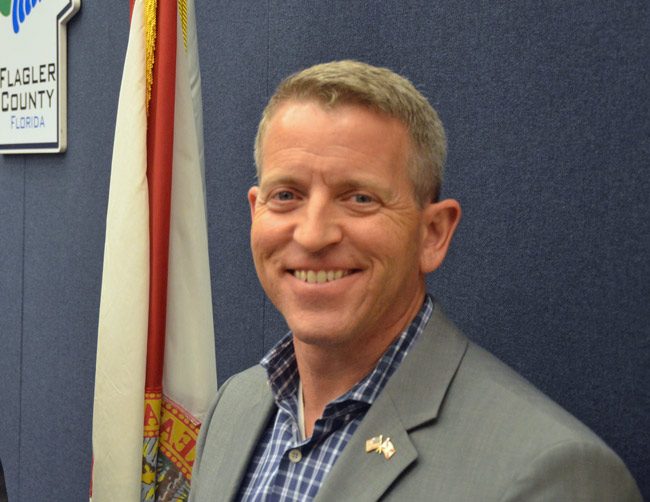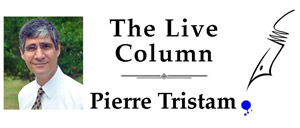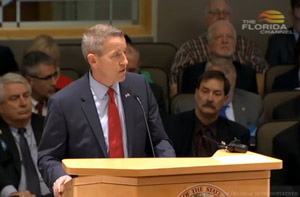
Last week a Florida House subcommittee voted to kill Enterprise Florida and Visit Florida. I don’t often find myself agreeing with our own Paul Renner, who’s sponsoring the bill, let alone with the Koch brothers, who are backing its repeal. In this case they’re right. The two state agencies are mostly unaccountable slush funds to a chosen few industries, and within those industries, a few chosen businesses. Since when have we become a planned economy?
 Enterprise Flagler is corporate welfare doled out like bribes to prospective companies that rarely make good on promised jobs. Same goes with Visit Florida. It’s taxpayer-funded marketing for resorts, motels, restaurants and such.
Enterprise Flagler is corporate welfare doled out like bribes to prospective companies that rarely make good on promised jobs. Same goes with Visit Florida. It’s taxpayer-funded marketing for resorts, motels, restaurants and such.
Gov. Scott, who might as well have a second home here (he’s campaigning here that often, his 2018 ambitions in mind), is coming to Flagler Beach Monday to visit a sandwich shop and make up stories about how his two beloved slush funds somehow benefit the region. Talk about fake news. He was on stronger ground when he made sure State Road A1A was rebuilt quickly. That made a more serious and lasting difference than any $78 million Visit Florida splurge ever could.
Yet the local chamber of commerce and a good number of Flagler’s elected officials have been hysterical over the bill, badgering constituents to oppose it. It’s the way it was last year when Scott made his pitch for a quarter billion dollars for Enterprise Florida. The Legislature put a stop to that obscenity, but not before local leaders embarrassed themselves shilling for him. The very same county and city leaders who’d been begging the state for help to pay for water and wastewater projects, roads, drainage, mental health and other services suddenly turned into rote lobbyists for money not only syphoned off of their own needs, but money they’ll never see, money Scott wants to use to bribe businesses on the off chance that they might send a few jobs down Florida’s way. But Enterprise Florida has been a sham, and the one governor who might as well wear the ROI (return on investment) acronym like a monogram on his shirts—at least when it comes to public employees, public schools, public services he wants to get rid of–gives Enterprise Florida a pass on that one.
As an Integrity Florida report noted in 2012, Enterprise Florida has been a cesspool of conflicts of interest behind a self-serving wall of secrecy, thanks to inexcusable exemptions from the state’s open records law. Corporate seats on the board of Enterprise Florida are sold like modern-day simony for $50,000. Board members get tax incentives through the agency and serve as vendors. The very same company that was contracted to calculate the agency’s return on investments is a company that got tax incentives from the agency. Most damning of all was the finding that out of $1.7 billion in incentives on the promise of 225,000 new jobs since 1995, only a third of those jobs had come through almost two decades later. That calculation predates the Sanford Burnham fiasco in Orlando, the medical research company that got $350 million in incentives on the promise of 303 jobs, up front, fell short by 66 jobs, refused to pay any money back, and now its faculty is leaving.
Of course state government has a big role in the state’s economy. But that’s what the $1 billion Department of Economic Opportunity is for, as its name implies. The department pays attention to workforce development, the unemployed, job training and housing assistance, but it also recruits new business and promotes the expansion of existing businesses with accelerated permitting, incentives and grants to local communities. That’s economic development. If government has played a role in improving the economic climate, it’s largely through the Department of Economic Opportunity, not Enterprise Florida. And it’s done it mostly with federal, not state dollars: almost 70 percent of the department’s budget last year was federal money.
Enterprise Florida, on the other hand, is supposedly a private-public partnership that should have its budget split 50-50 between private and government dollars. And it’s on a performance-based contract with the Department of Economic Opportunity. In reality, the private sector never lived up to its commitments. A December report by the Office of Program Policy Analysis and Government Accountability (OPPAGA) found that the private sector has barely contributed 10 percent. (It’s a larger echo of Flagler’s own Enterprise Flagler, which local governments finally gave up on almost seven years ago for the same reasons: it never lived up to its promise creating jobs, and the private sector never contributed its fair share.)
Then there’s Visit Florida. Visits to the state have seen an essentially steady and unstoppable climb, year after year, going back to the mid-70s, with some wobble during recessions, Visit Florida or no Visit Florida. But to hear Scott killing the agency’s most egregious spending (like a secret $1 million deal with rapper Pitbull, who revealed the contract only after the House Speaker sued him) would be such a disastrous “job-killer” that he’s taken to all-caps tweets, à-la-Trump, to make his end-of-the-world claims. (And we know how much truth there’s been in his role model’s heaves.) Of course the local propagandists have joined right along.
Amy Lukasik, the tourism and marketing director for Flagler County’s tourism division, spoke for just about a minute to the House panel and managed to pack quite a few howlers in those seconds. She said the CEO of Visit Florida and representatives of the state’s restaurant and lodging association visited after Hurricane Matthew, viewed the damage and “had conversations on how they could immediately help overcome the national attention they received stating our destination was closed for business.”
I don’t know where Lukasik got the notion that the place was closed for business. I certainly hope that’s not what she and her boss Matt Dunn, the local tourism director whose relationship with facts is often a fascinating study in surrealism, conveyed to the marketers from on high: Flagler Beach started reopening its beaches within two weeks of the hurricane, and as local media screamed it within a couple of days of the storm, nothing else was closed for business (Washington Oaks Garden State Park aside), least of all the businesses along A1A. I’ve never known Flagler Beach to be the sort of town that’s ever depended on tourism’s equivalent of kitty-cat videos on randomized sites to take care of itself: the city was back in business, including its beaches, thanks to its volunteers, its city commission and city manager, and of course its businesses, all of which screamed “We’re Open!” What helped them at the south end of town wasn’t those odd videos, but the very fast reopening of State Road A1A. What will help them is state and federal commitments to rebuilding the dunes, not pixelated smiley faces.
Visit Florida apparently produced four videos that were “posted” to unidentified social media “platforms” and through those randomized Google ads on no site in particular, and were allegedly seen by 2.3 million people and counting, which sounds like the numbers were gathered over a few months. Sounds impressive, right? Of course Lukasik did not say whether the videos were actually watched or whether they merely had 2.3 million impressions somewhere in the ether—which is the number of times an ad appears on a site, as opposed to the number of times it’s actually clicked on or actively viewed if it’s a video. Last month alone FlaglerLive’s ads together collected 9 million impressions, which is nice, but that doesn’t mean they got clicked on that many times, though the number tells you something else: Flagler’s 2.3 million through Visit Florida sounds pretty lousy in comparison. I realize it’s an unfair comparison—we provide facts, not fluff—but still: when a local non-profit news site with about 0.1 percent of Visit Florida’s budget can give its advertisers that much more exposure, you’ve got to wonder about how much of that $78 million gets wasted.
Lukasik claimed to the House panel the video plug “has shown dividends to our small business owners.” Her proof? “In just one month following Hurricane Matthew our collections rose 16 percent over the previous years.” I’m not sure where that number comes from, or whether Lukasik has her timeline right, but the month after Matthew was November, and in November—the last month for which data is available to us—collections were down 9.2 percent. Let’s assume Lukasik was referring to the as-yet-not-published December figures, which she has likely seen by now, and which might show that 16 percent increase. But those fluctuations aren’t unusual: there was a 22 percent increase in October 2015, the year before had several months with double-digit increases and several with much less, last year had a couple, and none could be relatable to Visit Florida’s videos. In essence, the link Lukasik was making—if her number is even accurate—is speculative, not evidence-based.
But that’s usually the case with our tourism division, as it has been with Visit Florida, as it has been with Enterprise Florida.
As Renner put it to the same House panel Lukasik spoke to, “ultimately, economic incentives are most wrong because they pick winners and losers. For every success story that can be named today, there’s a horror story lurking right behind it,” such as Sanford Burnham. “It is simply beyond the capacity of government to correctly pick winners and losers. But beyond that, when we give money to one company, we disadvantage their competitors. If you get $2,000 an employee, and you’re a competitor and you get nothing, it’s disadvantaging your business. And so we don’t assess in our return on investment the negative impact on many, many businesses, competitors, and especially our small businesses.” (See his full remarks below.)
In other words if it’s fairness and accountability you favor, it’s time to end the thievery of Enterprise Florida and Visit Florida and look past its fabulous marketers’ propaganda.
![]()
Pierre Tristam is FlaglerLive’s editor. Reach him by email here or follow him @PierreTristam.
![]()
Rep. Paul Renner Defends His Bill

For all the attention on this bill, I believe that support for it is really quite easy if we first talk about some basic principles that we all agree on.
The problem with economic incentives are multifold. It begins with the problem that it takes from the many to give to the few. Every taxpayer either directly or indirectly pays toward economic incentives, yet few see any benefit. Most of us pay our taxes with an implicit promise: that something that everyone gives will come back to everyone. Things like public safety, roads and bridges, a good education. We want to know it’s safe to walk on our streets, we want to know our students can graduate ready for the workforce, we want to know we can cross bridges without them collapsing. These are important things not only to the basic, core functions of government, but also to economic development.
So related to that, when we spend hundreds of millions of dollars on economic incentives for a few companies, we steal money from those core, critical priorities that we all share an interest in. We also steal money from small businesses. Our small business, we all know, generate most of the jobs in the state of Florida. Most of us work for small businesses. But small businesses don’t see the benefit of these incentives, because the majority of the incentives in the state of Florida go to employers with greater than 1,000 employees.
And finally, ultimately, economic incentives are most wrong because they pick winners and losers. For every success story that can be named today, there’s a horror story lurking right behind it. A recent example is Sanford Burnham where taxpayers spent over $350 million in incentives, and they’re now leaving the state. So this is not a case of companies not coming into Florida, or not staying in Florida, which you’ll hear about, because we don’t have an economic incentives [sic.]. The company left with economic incentives.
It is simply beyond the capacity of government to correctly pick winners and losers. But beyond that, when we give money to one company, we disadvantage their competitors. If you get $2,000 an employee, and you’re a competitor and you get nothing, it’s disadvantaging your business. And so we don’t assess in our return on investment the negative impact on many, many businesses, competitors, and especially our small businesses.
Members, incentives violate these core principles of fundamental fairness, and they’re a bad deal for taxpayers. This is why we’re moving to eliminate the programs that are listed on page one of your staff analysis. That’s the why of this bill.
So let me talk about the how. Basically, when these programs are eliminated, all funds that were normally going toward incentive programs will revert to general revenue. For those programs under Enterprise Florida that are not eliminated, and there are some of those programs we can talk about, those will go to the Department of Economic Opportunity and roll-up under what’s called a Type 2 transfer. I’ll also note that programs that are currently in place will remain in place provided those companies meet their obligations and the contingencies in their deals. However, if they fail to meet a deadline, there will be no extensions or modifications, and they will lose those incentives.
Before economic incentives became fashionable, our country became an economic superpower. We didn’t do that through government intervention. We did it for one simple reason, because while everybody else was following a different path, we were the true champions of economic freedom, where if you had an idea and the will to work, you could go places. This bill represents a very, very important step back on the right path, the foundational path that will lead to prosperity for Floridians. It’s the secret sauce of prosperity, and today we begin that process to get us back on that path.





























Wishful Thinking says
Double BRAVO! Bravo for Rep Renner for having the guts to expose this on-going sham – and Bravo to FlaglerLive for letting us know that there are some politicians who care about this. I will do my part to see this bill get to the full floor.. Thank you Paul – Thank you Pierre. Hopefully no more $33 breakfasts on the agenda for the favored ‘busiinesses’
Fredrick says
Holy Crap Pierre!! We agree on something.. I think this may be the end of times! Good article.
Pogo says
Thanks to Mr. Tristam and Mr. Renner. Hopefully, people will retire Tricky Ricky from politics forever. Scott deserves to be haunted forever by the multitudes he has robbed and swindled; and the countless working poor who died or will die from his squandering the billions of dollars he flushed down a toilet by opposing Medicaid expansion.
I hope Mr. Renner reflects on who and how we got here. Much of the crime he opposes came into being from politicians in right to slave states (hmmm, which party is the champion of union busting?) who were eager and willing to poach jobs from one group of Americans to give to another group. “If we don’t work for less, they’ll move the jobs to another country.” Turns out, they (you know who they is- don’t you) they moved the jobs anyway. The biggest share of new plants in the right to slave states were built by companies that were glad to locate production using poor Americans to build things wealthy Americans like. The German and Japanese businesses kept on profiting, and the wealthy Americans and their politicians got theirs. Heads we win, tails you lose.
“I can hire one-half of the working class to kill the other half.”
– Jay Gould, Wikipedia
Common Sense says
As always, excellent article Pierre. Only insiders benefit from the taxpayer dollars poured into these two agencies.
Kevin says
Kudos to Rep Renner standing up to the cronyism that gives politics such a bad name. Transparency is not in Gov Scott’s vernacular!
Anonymous says
Renner needs to do more about what he knows that shouldn’t be. His ear is bent and hopefully what has gone in hasn’t fallen out the other side. Come on Paul…still waiting.